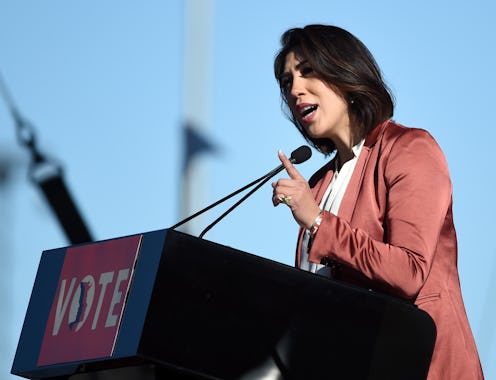News
This Woman Is One Step Away From Becoming The First Native American Governor — Ever

Idaho could soon become the first U.S. state to elect a Native American woman as governor. Paulette Jordan won the Idaho primary Democratic nomination on Tuesday, and though she faces tough odds in a deep red state, progressives hope that she's inspired enough activist energy and support to push her over the edge.
Jordan beat A.J. Balukoff — considered to be the establishment Democratic candidate — by over 18 percentage points, according to The New York Times. This November she'll face Republican Brad Little, who beat his opponent by a much smaller margin of about 5 points.
Jordan ran on an economically populist platform and made a point to criticize lawmakers with ties to corporations. Her campaign has also prioritized education reform, issues of healthcare access (she wants to expand Medicare), and environmentalism. She's not afraid to talk about issues of identity, either.
"I come from a powerful line of women. I'm proud of that heritage and legacy," Jordan has told CNN. "The opportunity for women is now. The President is divisive. Women know we can bring the country together. I'm working to defend my state, my people, even as this President is part of spreading hate and fear."
The United States has never before had a Native American governor, woman or man (though there have been some who descended from native Hawaiians). But Jordan, who is part of the Coeur d'Alene tribe, isn't totally alone this year: Peggy Flanagan of the White Earth Band of Ojibwe is running to become lieutenant governor of Minnesota. If elected, Flanagan would also make history by becoming the nation's first Native American person to serve in that position, according to the Twin Cities Daily Planet.
Jordan and Flanagan would become the highest-ranking indigenous women to ever hold public office, if elected. But the four Native American women who are running for Congress this year could also snag that title. A record number of indigenous people are running for public office in 2018, according to In These Times.
"American Indians have been invisible for so long, in so many sectors in society," Denise Juneau, who is descended from the Blackfeet Tribe and served as the superintendent of Montana schools until last year, told The New York Times. She noted that it is "huge" to "be able to make inroads in the political world."
Before running for governor, Jordan served in her Idaho's House of Representatives for about four years. For a time, she also served as the youngest member on Coeur d'Alene's Tribal Council and was a senior executive with the National Indian Gaming Association. She says that the feedback she got while holding these leadership positions encouraged her to run for governor.
"People were noticing my impact and seeing the effectiveness of my leadership," she told Bitch Media in March. "That doesn't sound very humble, but people were telling me, 'We see what you're doing. We want to see that brought to the state level.'"
It won't be easy for Jordan to secure a win in November. Idaho hasn't had a Democratic governor since 1990, and the state voted for Trump over Hillary Clinton by about 32 percentage points in 2016. But Jordan believes that she can garner support that transcends party lines.
"As a person of color, and coming from my background, it's [...] about teaching people to lead beyond the parties," she told Bitch Media. "And that's what I love about my vision: I'm very progressive and rural, but I also come from a strong one-party-driven district and state. I've been able to show people how to invest in our government through leadership by having compassion for humanity and showing kindness."